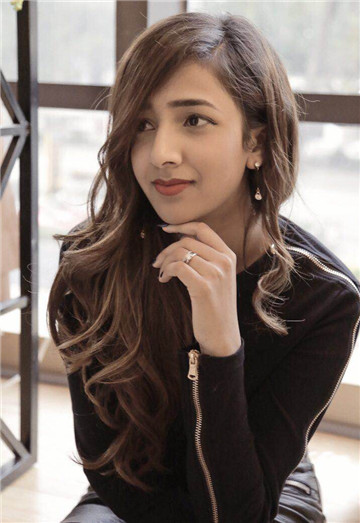Second generation expat starts career in SZ
Writer: Cathy Mo | Editor: Jane Chen | From: | Updated: 2018-08-13

Kriti Gupta
Email of the writer: 865068803@qq.com
APPLYING BB cream to her face and red lipstick to her lips, Kriti Gupta kept saying “Sorry” during an interview on a rainy summer morning.
The Indian girl, who plays multiple roles, from model to bar manager and English teacher, was getting ready to rush to her next appointment of the day. “I’m going to meet my agent and act for an ad shoot,” she said.
Born in Hong Kong in 1996, Gupta comes from an Indian family that has been living and trading in Hong Kong for more than 60 years. She crossed the border to live with her parents in Shenzhen at the age of 15 after her father's business in the city became stable as he had opened an Indian restaurant and become the Shenzhen CEO of the Indian IT giant Spice Mobile.
After finishing high school at Shekou International School, Gupta studied at Hong Kong University and graduated from a medical school in the United States.
However, Gupta did not end up becoming a doctor, instead choosing to start her career by running a bar, possibly due to her family's genes.
She tried her luck with a mini bar beside her father’s Indian restaurant, introducing traditional Indian fruit-based Sheesha (an oriental tobacco pipe with a long flexible tube connected to a container where the smoke is cooled by passing through water) smoking to the trendy youth.
When asked why she decided not to find work outside China like many of her high school classmates, she said, “As a second generation expat settling down in Shenzhen, I stayed in the city firstly because my parents are here. Secondly Shenzhen is a fast-growing city with quite a variety of people from different parts of China and the rest of the world, which provides opportunities and gives me a huge market base. I can learn a lot of things from these people and they can also help me keep up to date with what is going on in the world.”
“Thirdly, I think I have an advantage that many other expat business people don’t have: my knowledge of the Chinese language. My fluent Manderin and Cantonese have really helped me a lot in my work, and I can even help companies translate from English to Chinese, or Indian to Chinese. In daily life it’s so useful that I can easily communicate with local people. It sometimes makes me feel like I'm Chinese myself,” Gupta said.
Gupta has been to many places in China with her mother, who was engaged in the scarf fabric business years ago. “We are surprised to find many similarities between the two cultures. For example, in Indian marriages and weddings, we also follow the rules of The Five Elements (wood, water, fire and earth), and the Indian calender is similar to the Chinese one.”
They also feel there are misunderstandings when they are asked weird questions by Chinese people, such as “Is it safe to live in India?”
She thinks these people must get that impression from Indian films screened in China and bad news from media and websites.
“Actually, at present India is like China. Both are large, developing countries with a big population, and rich history and culture.”
“In India, when anything big happens, it will be put online, on TV and in newspapers. That’s why it seems like India's not a safe place,” Gupta explained.